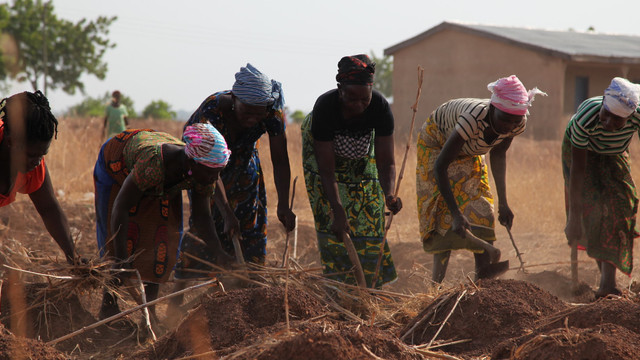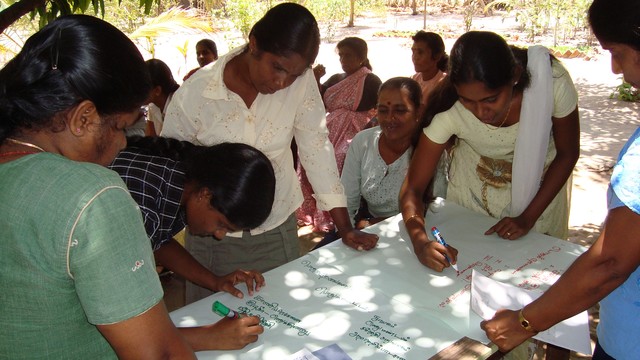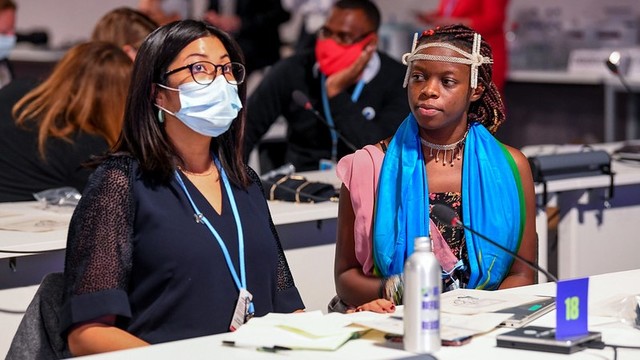IIED guidance on panel representation
At IIED, diversity, equity and inclusion are central to our mission ‘to build a fairer, more sustainable world, using evidence, action and influence, working in partnership with others.’ We believe that varied perspectives are needed to generate the ideas that can help solve some of the world’s most complex problems. New guidance on IIED participation in external panels, and on who is represented on panels organised by IIED, seeks to support this.

The in person and virtual panel of IIED's first hybrid event after the pandemic (Photo: IIED)
Led by our board of trustees, director and senior leadership teams, IIED has created practical new guidance on panel representation for use by staff across the organisation. This is set out below.
The guidance will support us to challenge ourselves – both as individuals and as an organisation – to take the time needed and do the advance planning and preparation required to ensure that we have diversity of voices in our external representation and panel events (taking account of gender, race, age, sexuality, ethnicity, caste, disabilities and geographical representation where relevant).
We believe we should recognise expertise, diverse knowledge systems and lived experience and be alert to avoiding the easy options when selecting speakers; this guidance will help staff to achieve this in practice. We also want to be sure that we acknowledge challenges of different possible speakers, such as issues of time, translation and technology.
Above all, we commit to take affirmative action to redress the imbalances that all too often happen when we are creating panel events or responding to invitations to participate.
We also recognise that making strong decisions on representation can be complex and will require case-by-case decision making and reflection.
We will need to act against our own conscious and unconscious biases to avoid limiting the selection process. There is no prescriptive recipe that can work in all situations, but we can always make sure that we have asked ourselves the right questions.
We know that we will be faced with the dilemma of choosing between equal representation and affirmative action to redress an unequal balance. In this scenario, we promise that any IIED speaker will speak for themselves, to their own experience and expertise, and not on behalf of those they cannot represent.
IIED’s position on panel representation will be linked to our published statement on anti-racism and to our gender equality policy.
Issues to be aware of
As we adopt this guidance into our ways of working, two traps that we often fall into deserve note.
The caveat trap
There will always be cases that do not fit with the strong standard of diversity that we are trying to achieve. Sometimes putting forward the only true IIED experts on a topic might result in an unbalanced panel. If this happens, we will ensure that the reasoning behind the choice of representative has considered all aspects of gender equality, diversity and inclusion and we are not merely legitimising the easy option.
This pledge acknowledges that not all individuals fall within the categories of male and female, such as people with non-binary identities. Individuals will never be asked to specify their gender identity.
The tokenism trap
It is important that those who represent IIED on a topic are authentic voices. While we want to be sure that we have considered all the relevant aspects of representation, we also want to avoid tokenism.
We will always explore all options to ensure panels are balanced and where they are not the reasons will be explained to avoid perceptions of tokenism and symbolism.
Guidance for IIED staff on panel representation
When preparing and running a panel event, colleagues should take appropriate time to:
- Ensure opportunities to participate internally and externally have been extended to a diverse range of IIED colleagues and partners considering gender, race, ablism and sexuality
- Encourage diverse participation when taking questions from the audience (for example, evidence suggests if you start with a question from a woman, more women will speak out)
- Take care when organising the order in which panellists speak
- Note that the chair or moderator cannot be included in the panel’s gender or ethnic balance – it is not enough to have a female/person of colour moderator and an all-male/all-White panel or vice versa
- Discuss IIED’s position on diverse panels with partners, if an event is co-hosted, and
- Be clear about what we hope to achieve and how this addresses the root causes of intersectional disadvantage and inequality that we are tackling in IIED.
Colleagues preparing to host an IIED panel event should avoid creating:
- All-male panels of two or more people
- All-White panels of two or more people where the subject of discussion concerns other non-represented categories
- Panels lacking appropriate representation from those with relevant direct lived experience (particularly with regard to race, age, disabilities, gender, ethnicities and sexualities), and
- Panels lacking appropriate representation from communities or individuals from relevant geographies and other categories discussed above.
These types of panel should also be avoided when IIED staff receive invitations to speak at events run by other organisations. To do this, we must find out more about external speaking opportunities before responding.
IIED will seek to discuss our values and motivations around panel representation with the institutions that invite us to participate, providing a way to influence change.
Receiving invitations
Some questions to ask when an external invitation to represent IIED on a panel arrives, even at short notice:
- What do we know about the organisation, the event, its purpose and the likely audience?
- Who are the other potential speakers? Is there any reason why we would not want to appear alongside them?
Note: When this information is not yet available, make a call on whether to accept based on the other questions here, such as the track record of the host organisation and the nature/goals of the event proposed. Use this as an opportunity to explain our values in terms of panel representation
- Are we being invited to validate a message that we would not wish to? Will we be able to be frank and put forward challenges should we need to?
- Who has the knowledge and experience in IIED or among our partners to speak to the issue? And of that group, does anyone have lived experience of the issue which adds value to their professional knowledge and experience, and would add value to how they represent IIED?
- Is this an opportunity to amplify a voice that has been historically under-represented in this space (for reason of race, gender, position in organisation or other)?
Of the IIED possible speakers, are they all, in principle, willing and confident to speak on behalf of IIED? Do they need support to build their capabilities and skills to represent IIED?



